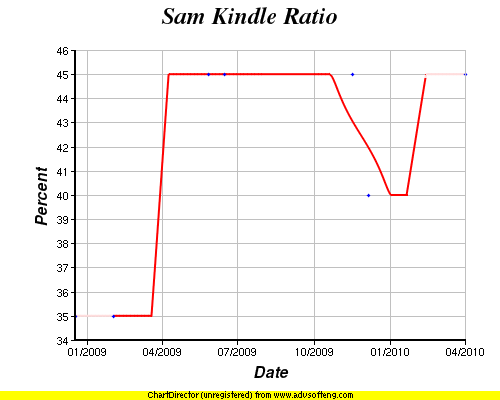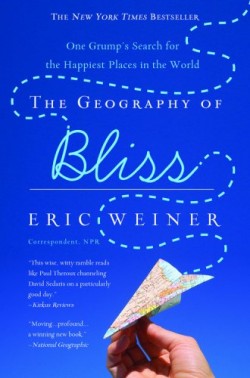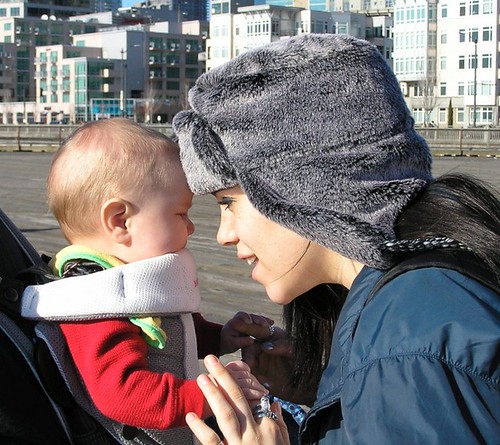And they look to be overwhelmingly positive so far. This is going to get interesting. Gizmodo has a good round up here.
|
So, after the last book I read the percentage of the last 20 books I have read that are available on Kindle returns to 45%. It had dropped to 40% previously. Now, a caveat to that number based on some additional investigation I did last time… there is at least one book in those 20 books, maybe more, where while the exact book I had is not available, a different edition of the same book is, which would raise this ratio a bit higher. But for consistency, I’ll be sticking to the method I have been using since I started tracking this, which is basically finding the exact book I read on Amazon, then seeing if they do or do not have the “this is also available on Kindle” banner. So… 45% for now. I have of course been saying for over a year now that I will officially want a Kindle once this ratio goes over 50%. One reason I’m being somewhat conservative about this is that I fully intend that once I switch over to electronic books, I will NEVER BUY A PHYSICAL BOOK AGAIN… except if I have no choice because I need it for work or class or something or I am really really desperate to read something only available in physical form. Now, that isn’t saying I won’t read a physical book if I have one given to me, or if it is one I already own in physical form and want to read… but I will be strongly resistant to buying any more physical books once I make the switchover. So, I don’t want to make that switch prematurely. Of course, while I have some bias to this device over others, so far none of the other dedicated e-readers have impressed me at all. Of course, my gadget lust right now is building rapidly for something else entirely. I probably won’t go there either in this first wave, but… since it is a device that will do e-reader stuff (including Kindle books as well as e-Books from other sources) but will also do all kinds of other things, it changes the whole evaluation equation in a way that is different than a dedicated e-reader. And yes, a dedicated device is optimized for that one specific thing (reading) and the multi-purpose device might sometimes be sub-optimal for that task (maybe), but… that is balanced by the other functionality. Although, really, if I had a multi-function device that I could also read books on, I think the amount of time spent actually doing such reading would be much less than on a dedicated device, because I’d simply be too tempted by the other functions… We shall see. In the mean time, it sure is taking a long time to break the 50% barrier on this metric I chose. I’ve specifically not picked books to influence this ratio. I was hoping my number would have gone up faster.
So, finally finished another book a few days back. As has tended to be my pattern the last few years, I have read much more slowly when I’m doing non-fiction books and this was no exception. As you can see above, I averaged a pitiful 2.8 pages per day. This of course was not a consistent rate, but rather it was many many days of zero pages, interspersed with days where I would read a bunch more. I basically didn’t read any at all in December, January or February, but then in March decided to actually start reading again and finish it off. Anyway… this is a book I got as a gift awhile back. It is about this guy who decided to research “happiness” and how it varied geographically… Are some countries happier than others? Can a person learn from the way different countries approach the idea of happiness and how they go about their lives in order to make oneself happier, etc. As part of his research he visited a variety of countries…10 countries including the US actually. Some were countries that on surveys had reported being happier than average… others the opposite, reporting that folks were generally much less happy than other places. He investigated how people approached life, what they thought made them happy, or not, etc. Overall, I think it was a pretty interesting travelogue of interesting places to live or visit, with a lot of nice stuff comparing and contrasting various aspects of these cultures. I’m not sure in the end if it really offers an answer to the questions he set out to answer about happiness… one conclusion did seem to be that if what makes you personally happy matches better the overall tone of life in some other place better than it matches it where you are at the moment, then perhaps you would be a better match for that other place. Maybe. I’ve always been more a “home is where you happen to be” type of person, but I can definitely see this. There are certainly places I have visited where I can confidently say a visit is the most I would like to do. In some cases a few hours is enough, in others maybe a few days or weeks, but I could tell I would be miserable LIVING in those places… There are other places I have visited that I immediately reacted with “I could live here, I could really like living here.” (Hint as to type of places for me, very urban environments with high population densities wear thin on me very fast and I want to escape, I generally prefer suburban, and really like more rural when I can get it…) Certainly different places I have lived have felt like more or less of a match, although I think for the most part how “happy” I was was only influenced by location to a small degree, with what was going on in my life, what I was spending most of my time doing, and who I was doing it with having a much much larger influence. But did the place and the collective effect of the types of attitudes and habits and lifestyles of those around me have a background effect that was perhaps significant in some cases? Sure, I’m sure it did. All in all this was an interesting thought provoking little volume. No answers really. But some nice profiles of some interesting places, some of which sounded like places it would be fun to at least visit… and maybe a couple of them would be places I could see living… worth the read. Although I do wish I’d had the consistency to go through it at maybe 10 or 20 pages a day at least instead of the truly pitiful 2.8 pages a day. I really need to do better than that. It is easy for me to do better than that on the fiction books, but bogging down on the non-fiction is something I need to get better at avoiding. We finished the pictures from my DC family’s visit in February that I had myself, but Cathy shared some of the ones she took with me as well, and said they are OK to post. The date/time stamps on these were all wrong by the time they got to me, but I believe this one was from February 21st sometime after 22:15 UTC but before 23:29 UTC. |
||


